During our coverage of the huge Destination London Star Trek convention last year, TrekCore organized an impromptu sit-down interview with well-known Star Trek writer/producers Ronald D. Moore and Ira Steven Behr. Both writers joined Star Trek: The Next Generation during its rocky third season – Moore stayed with TNG through its entire run, while Behr left at the end of the third year. Both eventually joined the Deep Space Nine team, where Behr inherited the role of executive producer when Michael Piller left the show to create Voyager.
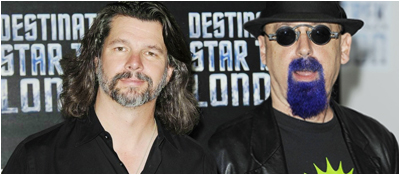
Ron Moore & Ira Steven Behr: The London Interview, Part II
Interviewed by Adam Walker and Chris Wales for TrekCore.com
![]()
TrekCore: So, you both moved from Next Generation very successfully to Deep Space Nine. Do you think that some of the darkness, some of the flaws in the characters that were so beautiful on Deep Space Nine could have ever worked in The Next Generation? Those characters were almost perfect in comparison. Do you think you could have ever moved that into The Next Generation, or were you restricted?
Ronald D. Moore: Well, we COULD have, but we were restricted! They weren’t going to allow us to do that but there was no reason why not. I think that when we were working on Next Gen, we always wanted to do that; we always wanted to make them more complicated; to have rougher edges to the characters; have them have interpersonal conflicts and make mistakes… but there was just a stricture against that and we tried to push against that as far as we possibly could but you just couldn’t get very far with it.
TrekCore: Were there stories that you wanted to do on Next Generation that then you then moved onto DS9, or that you were saving up that you couldn’t do? Even ideas that you had?
Ira Steven Behr: Well, not that I could move into DS9, but yes. One of the reasons why I chose to come back in Season Four was a story that I kind of broke with Ron up in his tiny little office, on a tiny little whiteboard it just freaks me out how TINY that board was, that somehow we got a whole story on there… which was the show that I was really jonesin’ to do, and he really liked, Piller liked it, everyone on the staff liked it; it was like, yeah! This is what I want to do!
Then it became a whole long story that I’m not going to get into now, but it got SLAMMED dead by Gene; it was my big ‘Gene meeting’, where he slammed me down with all kind of pronouncements about what Star Trek is and is not. And then, even after it was dead, I had to meet with Patrick – I had lunch with Patrick – and even though the show was dead, Patrick slammed it down, and made sure I knew that he would never do it, even though there was nothing to be done!
TrekCore: What was it?
Ira Steven Behr: It was simple. I created this planet called Risa, which was a pleasure planet. The captain was stressed out and needed a vacation. He went on this vacation and there was a holosuite there – or a holodeck – I guess a holosuite, we called it.
Ronald D. Moore: It was a holodeck.
Ira Steven Behr: Holodeck. It said, “Face Your Greatest Fear!” and it was like a carnival place. It wasn’t what it became, this sensual, open-sexuality place – Gene turned it into that! It was like this carnival atmosphere place; a true vacation resort. And he thought, “Oh, cool, this is going to put me in a good mood. What I need is to fight some Klingons without thinking about the repercussions of it, or go after some Romulans or whatever it is.”
And he goes into this holodeck, and it was all about the captain being promoted to admiral, and losing the Enterprise, and Riker being bumped up to captain of the Enterprise. Basically, though we never really hit it on the head, it’s about growing old. Not to grow old, but your time of life changing and suddenly you’re not going to be the guy going off on adventures, you’re going to be sitting at a desk somewhere, SENDING people on adventures. That’s his greatest fear.
Gene went STARK RAVING MAD. It was like, “Picard fears nothing. If it’s time for him to grow old, to become an admiral, he becomes an admiral! He would not think about that, AT ALL. Picard is John Wayne!” Well, John Wayne had all kinds of fears and guilt and angers and bitterness in his best movies… “No. John Wayne is a hero, Picard is a hero, we are not doing this episode.” Even though I guess this had happened a lot on the show in the first couple seasons, it hadn’t hit us.
It hadn’t hit me, or certainly Ron either… it was just like, it’s dead! But Michael loved it, and it was gonna happen, and Rick was saying, “Look, there’s nothing we can do.” And that’s when Gene sat there, “…but I LOVE the pleasure planet! Get the captain laid!” “Patrick wants to get laid; he doesn’t do enough f—ing and fighting, you gotta get him laid!” Suddenly, it turned into sexual fetishes, and we were gonna have women making love to women in the background, and men kissing men… it’s like, I’m thinking, “I have entered into some kind of Phantom Zone. Some kind of strange new world!”
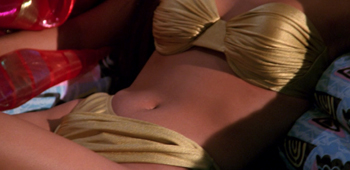 Behr’s original design for Risa was much different than the final result.
Behr’s original design for Risa was much different than the final result.
I walked out of the office, Gene’s office… and Gene was very nice, but it was like NO discussion. I turned to Rick, and I said, “Men kissing men? Women caressing women?” He goes, “Oh, don’t listen to anything Gene says. Write a story where the captain gets laid and has some fun.” And it was like, that was it. If that’s the show… and I wrote it, because I’m a whore! And, you know, it was okay, but it wasn’t what it set out to be. And that’s ultimately why I left.
Ronald D. Moore: And what a difference a year makes, because the next season, I wrote a show called “Family“. Picard goes back home to Earth, with his brother and so on. Same kind of setup, I wrote this story; he goes home and has this fight with his brother, it’s an old family animosity and bitterness that boils to the surface of these two brothers.
Gene HATES it. I had my version of this meeting, not by myself; it’s with me and Rick Berman and Michael Piller, we all go into Gene’s office. Gene goes through this whole thing about how much he hates this script. “It says terrible things about Picard’s parents; these brothers don’t exist in the twenty-fourth century; they have such profound personal animosities; this would never happen. I don’t buy any of this, this is not a Star Trek episode. There’s no action in this; there’s no jeopardy. We can’t do this show.”
I was like, shell-shocked. We walked out of the office, and I remember going into that hallway of the Hart Building with Rick and Mike and saying, “What do I do?” At that point, Rick and Mike just looked at each other and said, “Don’t worry about it; we’ll take care of it. Go write your script.” I went, “Okay…” and I went off and wrote it, and never heard another word. Somehow, they were then dealing with Gene in a different way and that script just went through after that point. He just stopped kind of throwing out scripts and chaning things from that point forward, and just started slowly to change.
Ira Steven Behr: I think also – because I remember you calling me up and saying “Watch it!” it was like the second episode – it was very early in the season.
Ronald D. Moore: The second of the season.
Ira Steven Behr: When we were doing what became “Captain’s Holiday“, it was in the middle of a very screwed-up season. We were behind… when you say that Michael was in the room with you, which you never told me, it’s like, “Why did Michael come in and fight?” Michael was rewriting… you know, we were holding on, really, by our fingertips to not shut the show down! It was just… I felt like I was tossed away and I don’t want to overplay it, but we were really excited.
It seemed like, “Yeah, this is the kind of thing we have to do!” We were just so excited, and it was so great to be exciting, like, this is the beginning of OUR Next Gen – not even Next Generation, our Star Trek. We were going be creating this thing and I just couldn’t get over it. It was a big wound.
TrekCore: When you guys moved to Deep Space Nine, you got to do this grittier, darker series, which you always wanted to do. Did you have to fight for that, or was the studio actively trying to push you down Gene’s idealistic, perfect world again? Or did they not notice because the other shows were on the air?
Ronald D. Moore: Well, by the time that I got there, it was already in that place. I don’t know how hard it was in the first season or two to get that tone.
Ira Steven Behr: Well, you know, what happened was, when I went to this ball game with Mike, and Mike said, “I want to read the bible” – not even the pilot which hadn’t been written yet. What he said was, “This show is going to reflect your sensibilities, it’s going to be edgier, funnier, grittier, more character driven, and after two years I’m going to hand the show over to you.” So that sounded really good, and that’s why I came back.
But almost immediately after the pilot, cold feet started to develop all over the place. It was like, “Make the show more TNG-like.” Not so much “don’t make it so dark”, it was just like, what kind of shows are we going to do?
TrekCore: This is why we saw Q and Lwaxana Troi coming in.
Ronald D. Moore: Yeah.
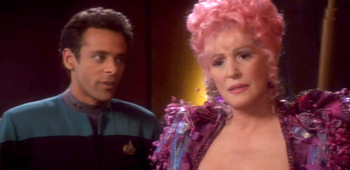 Several familiar TNG characters made appearances in the early days of DS9.
Several familiar TNG characters made appearances in the early days of DS9.
Ira Steven Behr: So, it was like, this is getting away from us. So we started to have to… not fight, so much, but make sure we came up with stories that were more specific to our series. It wasn’t until the end of the first season, with “Duet” and “In the Arms of the Prophets”, I think…
TrekCore: “In the Hands of the Prophets“.
Ira Steven Behr: Yeah, “In the Hands of the Prophets,” that we really started… and there were some other good episodes at the beginning and throughout, but it was… and then the studio got freaked out and said, “Should we put engines on the space station and fly it through the wormhole? Do we need the character of Bashir?”
So, you know, it really did seem to be on a knife’s edge at one point, but luckily we were able to weather that. Once we got the Defiant, which we had started talking about – and the Dominion, we prepared for that in the second season; we were setting the stage for the show to become what it became.
TrekCore: When you moved, Ron, from Deep Space Nine, you had a very brief spell on Voyager for a couple of episodes. Why do think that didn’t work? Differences with your writing style, or where there other problems?
Ronald D. Moore: You know, there were a lot of reasons that didn’t work. I think, ultimately, it was time for me to have moved on. I was there for ten years at that point, and there was a part of me that just did not want to leave. I wanted to keep my same office, it was a lot of money, and I knew Star Trek and I just sort of wanted to keep going. I don’t think I was aware that I had also come to the end of what I could contribute. When I went into that show, I pushed it in directions it wasn’t ready to go, it wasn’t ready to embrace what I wanted to so, and ultimately it was just a mistake. It was just like… I shouldn’t have signed up for it in the first place.
TrekCore: What do these things, these conventions, mean to you? What is it about them that makes you want to come?
Ronald D. Moore: Well, I haven’t done them in quite a while. I’ve been sort of out of this… I did one this summer in Vegas, and it was the first one I had done in a long time. It was just nice to reconnect with this community, it was nice to reconnect with writers and cast members I hadn’t seen in a long time. I was surprised, to be honest; I sort of thought it had thought, “Maybe it’s all withered away, and it’s not what it used to be.” I was kind of prepared for it to be a sort of low-key experience and I’m surprised and sort of impressed that there’s still a thriving fandom that supports this franchise.
Ira Steven Behr: I never like to look back. I never went back to my high school; never went back to my college. I don’t look back, you know, not that I didn’t enjoy it, but I just can’t do it. Enough time had gone by, and I started to do these interviews for Bill Shatner about Sisko and about TNG, and some other stuff, and it seemed okay suddenly.
It was nostalgic – not for other people, but for me. It was part of my past, an important part of my past, and like Ron said, it was just great to see everyone again and to be able to get this unconditional love. You usually have to have a little baby to get unconditional love! The fans kind of give you this kind of unconditional love, and who’s going to say no to that?
TrekCore: Guys, it’s been tremendous. Thank you so much.
Go to Part: 1 2
![]()
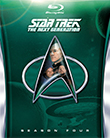 | Order Star Trek: The Next Generation Season 4 Blu-ray today! | 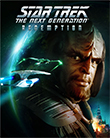 | Order TNG - "Redemption" Feature Blu-Ray today! |
|---|
